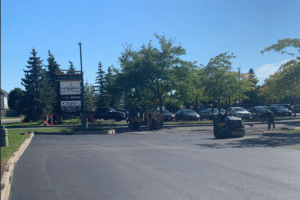Inside the Toolkit of Expert Paving Contractors
Paving contractors do more than pour asphalt. They plan, prep, and finish driveways, parking lots, and roads. Their job needs precision. It also needs the right tools. Without proper equipment, even skilled workers can't do much.
When you hire a paving crew, you're trusting them to build something that lasts. A good contractor won’t just show up with a shovel and truck. They’ll bring serious tools. Each one has a job, from laying out the site to smoothing the final surface.
If you've been searching terms like driveway contractors near me or paving companies in my area, you’ve likely seen many choices. But how do you know who’s worth it?
This blog shows what separates pros from everyone else their toolkit. We’ll walk through the actual tools used at each step of a paving project. You’ll learn what they do, why they matter, and how they help create long-lasting surfaces.
Knowing this makes it easier to hire the right people. Because in paving, good tools are never optional.
Why Tools Matter in Paving

In paving, the right tools do more than speed up work. They improve surface finish, extend pavement life, and reduce repair costs. Paving contractors near me who invest in quality equipment deliver better results.
Poor equipment can leave behind bumps, dips, and cracks. That means early repairs and higher asphalt driveway cost over time. Reliable tools mean fewer mistakes and more even coverage. That’s what you want, whether it's a small asphalt driveway or a big commercial lot.
The Must-Have Tools in a Paving Contractor’s Arsenal
1. Surveying and Preparation Tools
Every paving job starts with layout and prep. This is where things can go wrong before any asphalt touches the ground.
- Measuring wheels help calculate square footage quickly. Crews use them to figure out how much material the job will need. It also helps avoid running short or overordering.
- Laser levels are key to getting the slope right. Water should never pool on finished pavement. Laser levels make sure the surface drains as it should.
- Marking paint and chalk lines come next. These tools help crews mark where to cut, dig, or lay materials. Clean lines mean clean work.
- Soil compaction testers check how firm the ground is before paving. If the soil is too soft, the pavement will sink or crack later.
This part of the job doesn’t always get noticed. But it’s one of the most important. Skipping it or doing it wrong sets the stage for problems down the road. A well-prepped base makes the top layer last longer, look better, and hold up to wear.
Good driveway contractors never rush this step. It’s where experience and tools come together to set the project up for success.
2. Excavation and Base Prep Equipment
Once the layout is ready, it’s time to dig and shape the base. This part decides how long your pavement will last. Weak foundations lead to cracks, dips, and early wear.
- Skid steer loaders are compact but powerful. Crews use them to move dirt, remove old materials, and level the ground. They’re quick and easy to steer, even in tight spaces.
- Backhoes go deeper. They’re perfect for digging out thick layers of old pavement or trenching for drainage.
- Next, it’s time to build up the gravel base. This layer supports everything above it.
- Plate compactors are used for tight areas and edges. These machines press the gravel down until it’s solid.
- Large rollers are used for open areas. They weigh tons and provide firm, even pressure across the whole surface.
- Gravel spreaders help apply stone layers at the correct thickness. Uneven base layers can lead to surface problems later.
A solid base helps keep water out and prevents shifting. It also supports heavy loads, whether it’s cars, trucks, or equipment.
Professional paving contractors never cut corners here. They know a strong base means fewer repairs and happy clients.
3. Asphalt Paving Machines
The actual paving near me process starts with hot asphalt mix. It needs to be spread, leveled, and compacted fast while it’s still hot.
- Mechanical pavers are the stars of this stage. These machines take hot asphalt from a dump truck and lay it down in a smooth layer. The process is fast, steady, and precise.
- Dump trucks deliver the asphalt mix. They keep it hot while traveling from the plant to the jobsite. Timing is critical. If the mix cools down too much, it won’t bond well.
- Material feeders or transfer vehicles keep things moving. They help prevent the stop-and-start motion that leads to bumps or cold spots.
- Screeds are attached to the back of the paver. They smooth and pre-compact the asphalt as it comes out. The screed controls the layer’s thickness and slope.
- Vibratory plates help during final passes. They push the hot mix into small gaps and level out rough spots.
This equipment must work in sync. If any part breaks down or performs poorly, the surface will show it. Streaks, ruts, or uneven layers are hard to fix once they cool.
That’s why expert paving contractors check and tune their machines before each job. Good equipment makes good asphalt work possible.
Finishing and Compaction

After the asphalt is laid, it needs to be pressed and shaped. This step seals the surface and gives it strength. It’s also where many driveways get their final look.
Vibratory rollers are used first. These heavy machines shake as they roll, helping lock the layers together. They push out air and close gaps in the asphalt.
Pneumatic tire rollers follow. They use soft rubber tires that press into the mix. This helps remove small surface flaws and evens out the texture.
Crews also use hand tampers and asphalt lutes. These are for tight areas where machines can't reach, like edges and around drains.
If the contractor skips this step or uses the wrong roller, the pavement won’t last. Water will sweep in. Cracks will form.
Finishing tools are the unsung heroes. They give the pavement its final strength and smooth finish.
Driveway paving Ottawa often deals with freeze-thaw cycles. Proper compaction is critical in these conditions. It keeps moisture out and helps the surface resist shifting.
This is where real skill shows. Top paving contractors know how to match the right roller to the job and adjust based on temperature, material, and surface type.
Safety and Quality Control Gear
Good paving companies care about safety and quality. That’s why their crews wear proper gear and carry tools to check their work.
- Infrared thermometers help crews track the asphalt’s temperature. If the mix is too hot or too cold, it won't bond right.
- Straightedges and string lines make sure the surface is level. Uneven spots can lead to standing water and early wear.
- Joint testers check the seams between asphalt sections. If joints are loose or cracked, water gets in.
Crews also wear PPE (personal protective equipment). That includes hard hats, high-visibility vests, gloves, boots, and hearing protection.
Contractors who skip these checks may leave behind weak spots. That’s why experienced companies take time at each stage to inspect their work.
This gear may not seem exciting, but it protects workers and ensures you get what you paid for.
When comparing asphalt company options, don’t forget to ask about safety. It’s a sign of how serious a crew is about the job.
Tech Advancements in Paving
Paving near me has changed a lot over the years. Today’s top contractors use tech to improve results and save time.
- GPS controls help lay out driveways and lots with exact slope and position. This prevents errors before the first scoop of dirt is moved.
- Smart rollers track compaction in real-time. They alert the operator if an area needs more passes.
- Software apps let teams track progress, check material loads, and adjust for weather on the fly.
These tools aren't just for big highways. Many local companies now use them on smaller jobs, including residential driveways.
Tech doesn’t replace skill. It supports it. In the hands of trained workers, it makes jobs cleaner, faster, and more durable.
If you’re searching for pavement companies near me, ask if they use tech in their process. It shows they stay current and care about delivering quality work that lasts.
What Separates Pros from Amateurs
Lots of companies offer driveway paving Ottawa alone has dozens. So how do you know who’s well?
Pros come prepared. They show up with tuned machines, fresh gear, and a clear plan. They don’t borrow tools or rent last-minute.
They also train their crews. Every worker knows how to use each tool safely and properly. That means fewer mistakes and faster cleanup.
Amateurs take shortcuts. They may skip soil tests or compact only once. This saves time today but costs more tomorrow.
Ask questions before you hire. Ask what gear they use. Ask how often they replace blades, rollers, or burners. Listen to how they answer.
Good paving contractors respect their tools and your trust.
Summing Up
A smooth, solid asphalt driveway doesn’t happen by chance. It’s the result of good planning, strong tools, and skilled work. Now that you know what’s inside a paving contractor’s toolkit, you’re ready to make smarter choices. Whether you’re patching a driveway or paving a large lot, tools matter.
Looking for reliable asphalt paving or asphalt maintenance services in Ottawa? Don’t settle for shortcuts. Choose a team that invests in doing the job right.
At Black Tar Construction, we come prepared with the right equipment and a team that knows how to use it. Our work is built to handle Ottawa’s tough weather and keep your surfaces strong for years.
Call Black Tar Construction today and let’s build something solid together.
